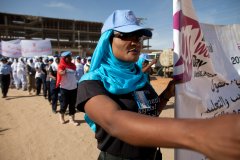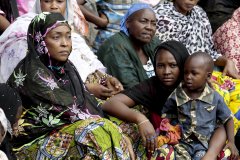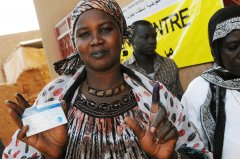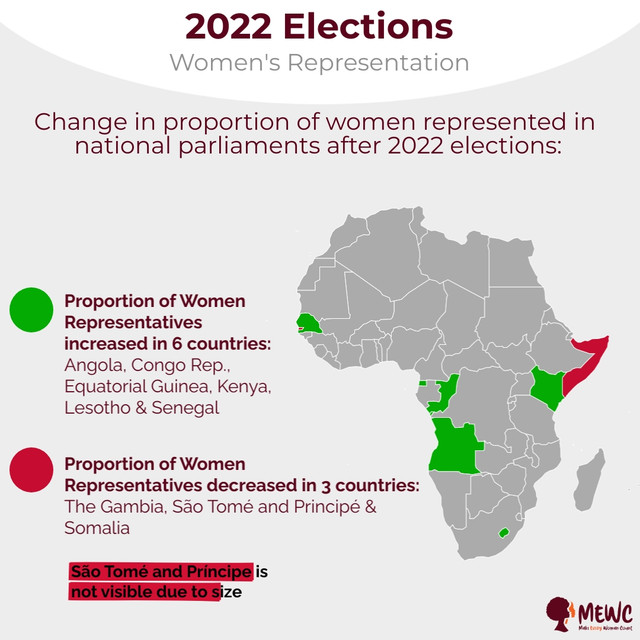Gender Issues Showlist
Women, Peace & Security
UNSCR 1325 calls on all parties to: protect and respect the rights of women and girls in conflict & post-conflict; increase women participation in all conflict resolution, peacekeeping and peace-building & to end impunity by prosecuting perpetrators of sexual and other violence on women and girls
index.php?option=com_content&view=category&id=56&Itemid=1913
Human Rights of Women
Thirty six years after the adoption of CEDAW, many women and girls still do not have equal opportunities to realize rights recognized by law. Women are denied the right to own property or inherit land. They face social exclusion, “honor killings”, FGM, trafficking, restricted mobility, early marriage,...
index.php?option=com_content&view=category&id=44&Itemid=1908
Violence Against Women
Violence against women is the most shameful human rights violation. Gender based violence not only violates human rights, but also hampers productivity, reduces human capital and undermines economic growth. It is estimated that up to 70 per cent of women experience violence in their lifetime
index.php?option=com_content&view=category&id=69&Itemid=1912
Political Participation & Leadership
Where women are fully represented, societies are more peaceful and stable. Women political participation is fundamental for gender equality and their representation in positions of leadership must be a priority for all Africans governments.
index.php?option=com_content&view=category&id=65&Itemid=1911
Latest News
- Chad: Parliamentary Elections 2024
- Namibia: General Elections 2024
- Mozambique: Parliamentary and Presidential Elections 2024
- Tunisia: Presidential Elections 2024
- MEWC is looking for Research & Communications Interns
- COTE D'IVOIRE: South-South Meeting to Promote Gender Equality and Combat Deforestation
- RWANDA: Rwanda Set to Launch Cervical Cancer Elimination Plan
- NIGERIA: Over 5,000 Nigerian Women Stranded in Iraq - Govt
- SUDAN: Healthcare Collapse Threatens Pregnant Women in Sudan's Sharg El Nil
- GHANA: President Nominates 12 More Ministers
LESOTHO: Parliarmentary Elections May 26th; No Female Candidates
Background of Election
With a population over 1.9 million, 916,230 individuals were registered to vote in the 2012 parliamentary elections held on May 26th.[i] The elections, originally scheduled for February, came amidst the creation of a new party, the Democratic Congress (DC). The DC was formed when a power struggle emerged within the Lesotho Congress for Democracy and Prime Minister Pakalitha Mosisili made a decision to brake away and create his own party.[ii] It was announced on the 29th of May that the newly formed Democratic Congress had gained the majority of the constituency seats, but needed did not gain a majority of the seats when the second round of seats were calculated on proportional representation.[iii] With these results and the only possibility to establish a coalition with the opposition, Prime Minister Pakalitha Mosisili decided to resign. As of May 31st, five opposition parties will form a coalition and a new prime minister will be sworn in within the next 14 days.[iv]
Status of Women
Lesotho has a dual legal system comprised of a customary and common law. According to the constitution of Lesotho, women are “”. However, in practice women are often at a disadvantage due to customary laws. Lesotho is a highly patriarchal society and women are often only allowed to participate in different sectors of society, politics in particular, if the prominent male in their household allows it.[v] In fact, when gender parity laws were mandated in local government for the first time in 2005, men from all over the country boycotted the elections. To take it even further, the quota was challenged in the High Court by a rural farmer claiming that his rights were being denied.[vi] The farmer, Molefi Tsepe, lost the appeal when the High Court dismissed his appeal and upheld the gender quotas.
Inclusive Government
Lesotho currently has no gender parity clause at the parliamentary level. The Lesotho Congress for Democracy (LCD) has an internal policy that aims to increase representation not only within their party, but in parliament as well.[vii] Furthermore, the LCD has a self-initiated gender parity clause, which ensures that 30% of its members are women.[viii] There is a branch of the LCD known as the women’s league that aims to promote women’s rights and honor women who have broken barriers in the male dominated society. The party has enough power to make former Prime Minister Pakalitha Mosisili review inheritance law in relation to the girl child.[ix] In the coming weeks, as coalitions are formed and a new prime minister is announced, we should have a better understanding of the role women have to play in the newly formed government.
Conclusion
With the prospect of political uncertainty looming and past electoral violence, Arch Bishop Desmond Tutu brokered a pledge between the parties to maintain peace by respecting the election results.[x] The African Union, the Southern African Development Community, and the Commonwealth provided observer missions to ensure a fair election.[xi] Overall, the elections seemed free and fair with minimal violence. The participation of women remains to be determined after Prime Minister Pakalitha Mosisili steps down after 14 years in power.





